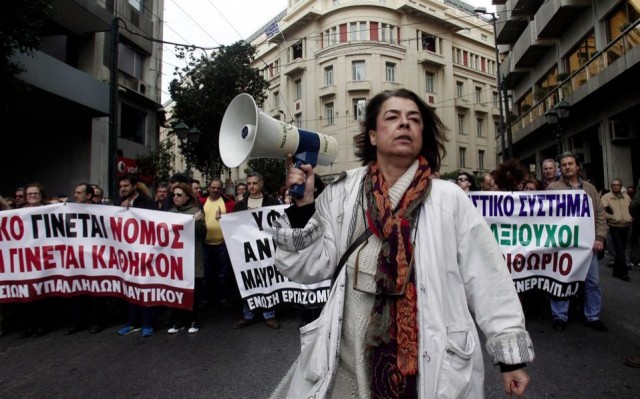
Greek workers from wide swath of unions participate in general strike against austerity measures, pension cuts Feb. 4, 2016
Opposition to pension reform has cut across wide swath of occupational groups
Youth participation widespread
![]()
February 4, 2016
Services across Greece ground to a halt Thursday as workers joined in a massive general strike that cancelled flights, ferries and public transport, shut down schools, courts and pharmacies, and left public hospitals with emergency staff.
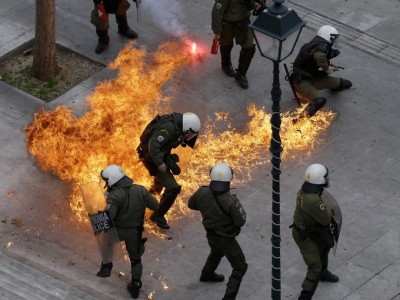
Riot police in Athens duck petrol bomb thrown by protesters Feb. 4, 2016
Well over 20,000 supporters of a Communist party-backed union were marching through central Athens, while around 10,000 more people — including about 1,000 lawyers in suits and ties — were gathering for a separate demonstration. A heavy police presence was deployed in the capital, as previous protests have often degenerated into riots.
Unions are angry at pension reforms that are part of Greece’s third international bailout. The left-led government is trying to overhaul the country’s ailing pension system by increasing social security contributions to avoid pension cuts, but critics say the reforms will lead many to lose two-thirds of their income to contributions and taxes.
Opposition to the reform has been vociferous, uniting a disparate group of professions, including farmers, artists, taxi drivers, lawyers, doctors, engineers and seamen among others.
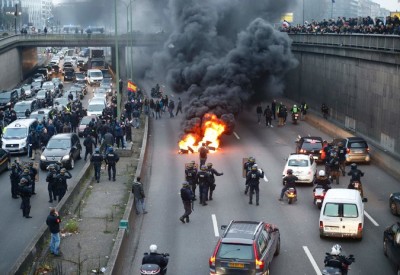
Taxi drivers block traffic, battle police
Demonstrations were also planned in Thessaloniki — where about 200 taxi drivers drove through the city centre honking their horns in protest Thursday — and other Greek cities.
Thursday’s general strike is the most significant the coalition government of Prime Minister Alexis Tsipras has faced since he initially came to power about a year ago. As an opposition party, Tsipras’ radical left Syriza party had led opposition to pension reforms, but he was forced into a dramatic policy U-turn last year when he faced the stark choice of signing up to a third bailout or the country being kicked out of the eurozone.
Syriza has even issued a statement backing Thursday’s strike.
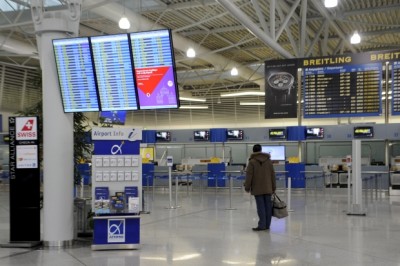
A passenger looks at an announcement board inside the Athens Eleftherios Venizelos International Airport, as flight controllers hold a work stoppage during a 24-hour general strike against planned pension reforms in Thursday. (Michalis Karagiannis/Reuters)
Athens pensioner Yannis Kouvalakis said Tsipras’ government “fooled” Greeks by promising to reverse austerity cuts.
“Because they are from the left, what happened? Was the situation saved? Things got worse. They’d said they’d give some money to pensioners or the unemployed, increase the minimum wage to 750 euros (per month),” he said. “They cut five euros from my pension … What can they give? Forget it.”
The strike comes as the government negotiates with Greece’s international debt inspectors, who returned to Athens this week to review progress on the country’s bailout obligations. The central Athens hotel where the inspectors were staying was heavily guarded by police.
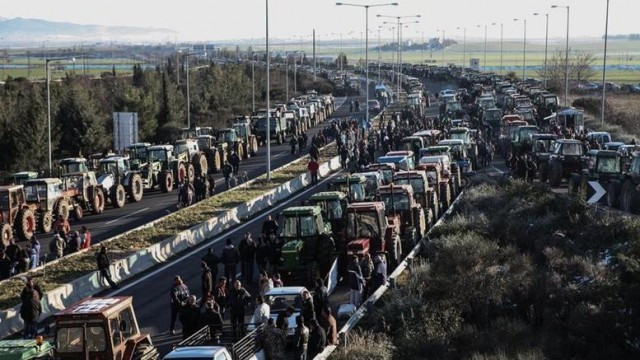
Farmers blockade Athens to Thessalonki highway.
Ferries between Greece’s islands and the mainland remained tied up in port as part of the strike, while only limited public transport was operating in Athens for a few hours in the day and taxis also stayed off the streets. More than a dozen domestic flights were cancelled, while farmers maintained their blockades of highways that have forced motorists into lengthy detours.
State-run hospitals were functioning on emergency staff, while state schools, many shops and gas stations were shut.
Greece strike disrupts transportation, services; brief clashes break out
Greek government pledges quick passage for bailout reforms
Greece settles terms with EU to get $14B bailout for banks
Greece election: Alexis Tsipras’s Syriza to hold 145 of 300 seats




